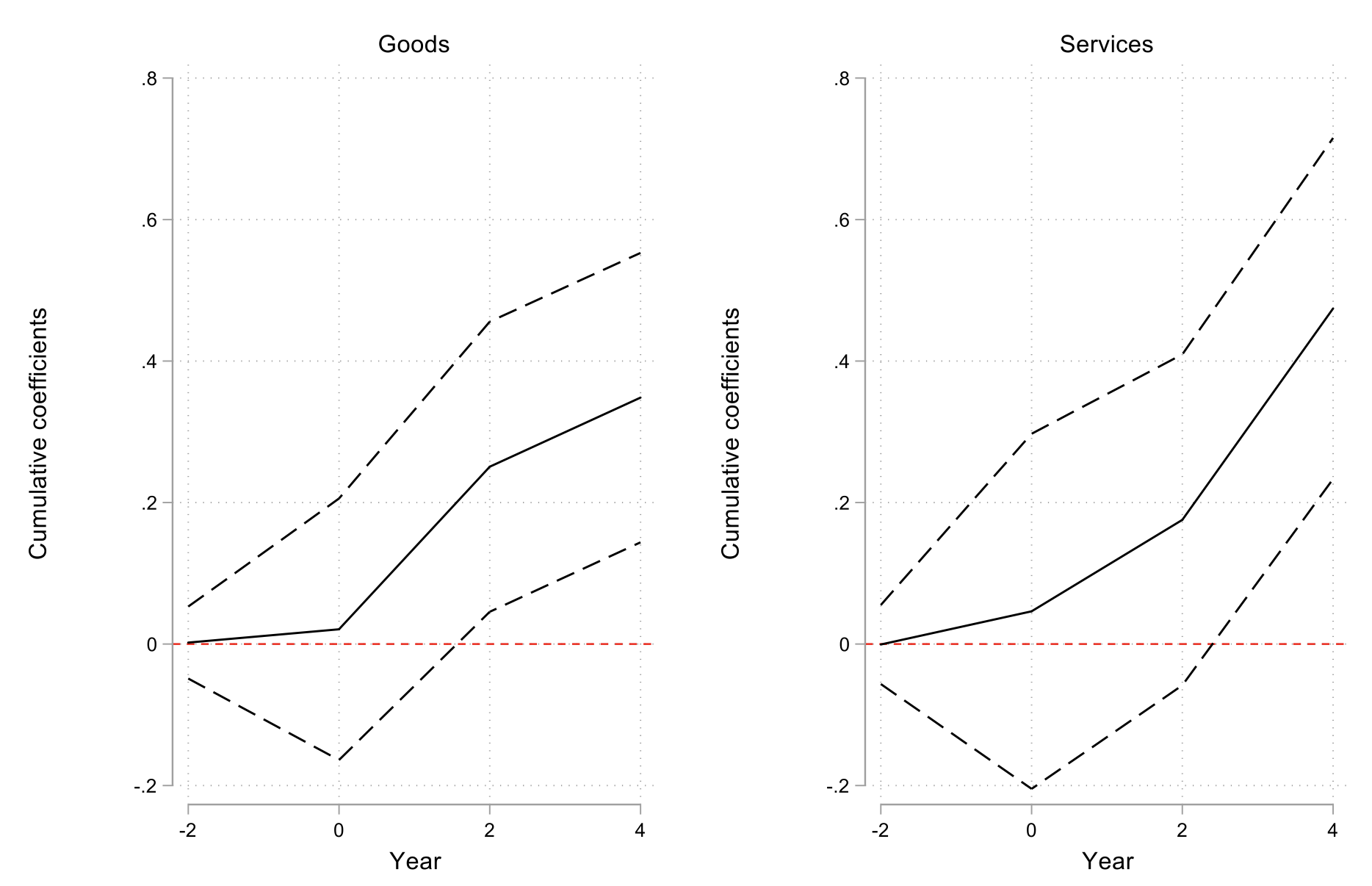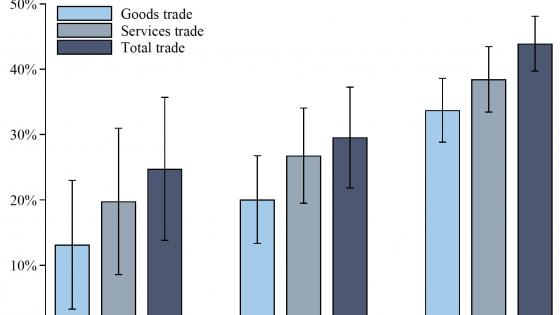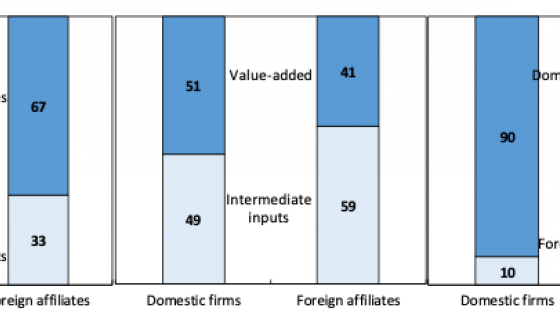Multinational enterprises (MNEs) are fundamental players in today’s global economy, coordinating trade and global value chains (GVCs (UNCTAD 2013, Quiang et al. 2021). Currently, MNEs and their network of foreign affiliates account for almost two-thirds of world exports, leaving only one third for independent firms not involved in multinational production (De Backer et al. 2019). In particular, foreign affiliates have a disproportionate role, being responsible for 30% of global exports. Moreover, MNEs’ foreign affiliates play a vital part in trading services cross-border, especially for services requiring the proximity of suppliers and consumers (Christen and Francois 2017, Andrenelli et al. 2018).
However, despite the economic importance of MNEs, the empirical literature on preferential trade agreements (PTAs) has focused mostly on the impact on trade flows, paying less heed to the effect of PTAs on investment patterns of MNEs and the output of their foreign affiliates. This literature has established that PTAs have a positive impact on trade flows, especially in the long run (Bergstrand et al. 2015). In particular, a recent body of empirical research has looked at the impact of deep trade agreements on trade, showing that deep agreements have a larger impact on trade flows than shallow PTAs, especially for trade in intermediate inputs and trade in services (Mattoo et al. 2017, Lee 2019, Dhingra et al. 2021). Deep PTAs – covering not only trade liberalisation for goods but also services, investment, competition, intellectual property, and a variety of other regulatory issues – are also expected to have an impact on multinational production (Baldwin 2011).
In recent work (Miroudot and Rigo 2021), we complement this literature by looking at the impact on multinational production and focusing on the role of PTAs with investment provisions, which are expected to have the most influence on MNEs’ investment and activity abroad (Lesher and Miroudot 2006, Chornyi et al. 2016). While representing one of the fastest growing types of provision covered in PTAs, investment provisions aim at giving access to MNEs to foreign markets and facilitating their operations. These provisions give the right to MNEs to create foreign affiliates, reduce the cost of establishment (similarly to tariff reductions for trade costs), protect foreign investment, and ensure national treatment (i.e. non-discriminatory treatment post-establishment).
PTAs with investment provisions have increased rapidly in the 2000-2014 period. In 2014, 46% of country pairs in our dataset had a trade agreement that included substantive provisions on investment, compared to only 14% in 2000. In contrast, country pairs with a bilateral investment treaty (BIT) increased moderately from 44% in 2000 to 50% in 2014. This finding confirms that trade agreements have become increasingly popular in dealing with cross-border investments, often replacing bilateral investment treaties or being signed between countries not having a bilateral investment treaty in force.
Investment provisions have a large impact on multinational production of goods and services
Our empirical analysis relies on a novel bilateral dataset with information on foreign affiliates’ production for a comprehensive set of countries and industries over the period 2000–2014. Our data allow us to distinguish between foreign affiliates operating in the manufacturing and service sectors. Due to the paucity of services data, the majority of research on the impact of trade agreements looks at trade in goods; only a few recent papers examine trade in services, leaving much to be discovered about the effect of PTAs on multinational production of services. This dataset also includes inter-country input-output tables split according to firm ownership, which enable to discern the type of activities that foreign affiliates perform (export versus domestic sales, and final versus intermediate production).
Using a structural gravity model and the variation in the membership and timing of trade agreements, we investigate the extent to which PTAs affect foreign affiliate production. We find that trade agreements with investment provisions have a large and positive impact on multinational production. On average, signing a deep agreement is associated with increased multinational production up to 26% in the manufacturing sector and 34% in the service sector. Moreover, Figure 1 shows that the entire economic effect of investment provisions cannot be fully captured in a single year. On average, it takes at least two years for PTAs with such provisions to increase multinational production of goods and services.
To rule out the possibility that our results are primarily driven by omitted variables, we control for the presence of other provisions in trade agreements and bilateral investment treaties. We also run a falsification test randomising the allocation of investment provisions across country pairs with a trade agreement. Finally, we propose an original instrument for investment provisions to account for both a potential omitted variable and reverse causality problem. Our combined evidence is consistent with the importance of investment provisions in driving multinational production of goods and services, and no other factors seem to be driving our results.
Figure 1 Dynamic effects of investment provisions on multinational production of goods and services
Source: Miroudot and Rigo (2021).
Notes: This figure shows the results from our baseline regression which is augmented to include leads and lags of the dummy for having an investment provision. The solid lines depict the cumulative effect and the broken lines the 95% confidence intervals.
Mechanisms through which investment provisions can affect multinational production
We also explore possible mechanisms at play behind the observed positive relationship between investment provisions and multinational production. We find that the effect of investment provisions on multinational production is stronger for industries in which working with the public is more important. This result suggests that one channel through which investment provisions help increase multinational production entails facilitating multinationals' activities in industries where a commercial presence (i.e. an establishment) is crucial. This novel finding, combined with the fact that working directly with the public is twice as important for services as it is for manufacturing, shows that investment provisions facilitate multinational production especially in the services sector.
In addition, we provide evidence consistent with the prominent narrative that deep agreements facilitate countries’ participation in GVCs. We study how the impact of investment provisions on multinational production varies with an industry measure of the fragmentation of production in GVCs. We find that investment provisions tend to increase multinational production particularly for industries that are more fragmented internationally. For instance, our results imply that the impact of investment provisions on multinational production is about 46% larger in producing electronic and optical equipment than that of producing textile and leather products.
Policy implications and further research
Understanding the effect of trade agreements on the activities of multinational firms is a fundamental question that deserves more attention in the context of declining FDI and calls for reshoring (Evenett and Fritz 2021). As our evidence suggests that trade agreements including substantive investment provisions have been a critical determinant in boosting the production of foreign affiliates in the past, one should look at whether these agreements also offer some protection against pressures for the localisation of production and new barriers to investment introduced by some countries during the COVID-19 crisis. Moreover, since PTAs include a large set of investment provisions covering both market access and national treatment, understanding the type of provisions that drive our positive results offers some avenues for further research and more refined policy implications.
References
Andrenelli, A, C Cadestin, K De Backer, S Miroudot, D Rigo and M Ye (2018), “Multinational Production and Trade in Services”, OECD Trade Policy Papers No. 212.
Baldwin, R (2014), “Multilateralising 21st-century regionalism”, VoxEU.org, 20 January.
Chornyi, V, M Nerushay and J A Crawford (2016), “A survey of investment provisions in regional trade agreements”, WTO Working Paper No. 2016-07.
Christen, E and J Francois (2017), “Modes of supply for US exports of services”, The World Economy 40(3): 517–531.
De Backer, K, S Miroudot and D Rigo (2019), “Multinational enterprises in the global economy: Heavily discussed, hardly measured”, VoxEU.org, 24 September.
Dhingra, S, R Freeman and H Huang (2021), “The trade and welfare benefits of deep trade agreements”, VoxEU.org, 21 January.
Evenett, S and J Fritz (2021), “FDI is in big trouble: Insights from the 27th Global Trade Alert report”, VoxEU.org, 3 June.
Lee, W (2018), “Services liberalization and global value chain participation: New evidence for heterogeneous effects by income level and provisions”, Review of International Economics 27(3): 888–915.
Lesher, M and S Miroudot (2006), “Analysis of the economic impact of investment provisions in regional trade agreements”, OECD Trade Policy Papers No. 36.
Mattoo, A, A Mulabdic and M Ruta (2017), “Trade creation and trade diversion in deep agreements”, VoxEU.org, 11 October.
Miroudot, S and D Rigo (2021), “Multinational Production and Investment Provisions in Preferential trade agreements”, Journal of Economic Geography.
Qiang, C Z, Y Liu and V Steenbergen (2021), An Investment Perspective on Global Value Chains, World Bank.
UNCTAD (2013), Global value chains: Investment and trade for development, World Investment Report 2013, United Nations.




